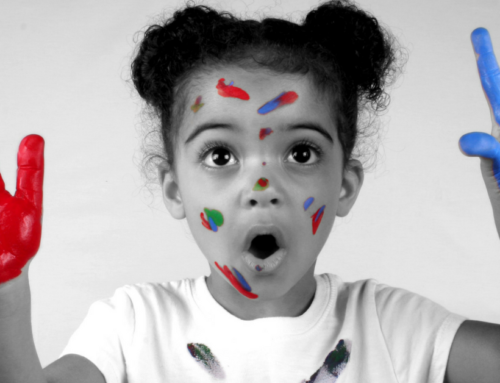As a parent, you want your newborn or toddler to grow in a safe and healthy way. If you’re looking for answers that could help your child’s development, consider the Montessori method. This method has proven to be effective from infancy, so your child can learn and develop in a way that meets their needs.
Here are 15 simple tips to help your baby become both smarter and healthier, using key lessons from the Montessori method.
Teaching Your Baby with the Montessori Method
1. Talk to your infant or toddler constantly. By speaking to your newborn or toddler in a gentle, but natural way, you are showing them how to communicate. The act of communicating also strengthens the bond between you and your child.
2. Play melodic music and sing to your child regularly. Music can play a strong role in a newborn’s development. You should never feel self-conscious about singing to your infant or toddler; babies are comforted by singing and enjoy it. Also, music can improve your baby’s mood, benefit brain function, and help hone language skills.
3. Touch your newborn and massage them. The sense of touch is so important to your little one. Massaging your infant daily can help you bond with them and make them feel safe and loved. The development of sensory processing functions begins at birth.
4. Read to your baby regularly. Reading is the epitome of teaching and communicating effectively with your child. This practice promotes a love of learning and reading in your newborn or toddler. Not only that, you’ll spend valuable time with your child and help encourage the development of a rich vocabulary.
Toddler Development: The Importance of Environment
5. Keeping your baby in a safe environment is essential. The atmosphere your infant or toddler experiences should not only be physically safe but should also be an emotional haven, peaceful and stress-free. Avoid bringing your baby to places that might disrupt your child’s sense of security. If there are times you need to handle legitimate disagreements with others, don’t do so in front of your baby.
6. Keep your infant’s environment free of clutter. It’s important for your toddler’s surroundings to be decluttered. This will allow them to explore safely without being overwhelmed. Keep it simple; don’t have too many toys or distractions. There is already a lot for an infant to take in from the big world around them!
7. Allow your infant to have freedom of movement. Let your baby freely move, crawl, and walk around in their environment. The Montessori method encourages constant exploration as a way to learn through experience. You will, of course, want to make sure your environment is baby-proofed to the necessary degree, but try not to impede on your child’s natural exploration. This independence is crucial to their learning and development.
Playing and Learning
8. Let your infant/toddler learn independence by doing activities by themselves. Though you will naturally want to do activities with your toddler or preschooler, they will also benefit from doing activities independently. When your toddler is happy playing alone, allow them to concentrate on what they’re doing without interrupting. You want your baby to develop creativity and to be able to solve problems without relying on someone else’s input.
9. Don’t ever do things for your infant once they can do it for themselves. You will always have a desire to do things for your child and to take care of them, that’s part of your role as a parent. However, you don’t want to hinder your infant or toddler’s growth by doing things they are able to do themselves. For example, once your baby can self-feed, it’s important to let them learn to eat independently. It might mean more clean-up for you, but letting them do it teaches them a necessary skill they will use the rest of their life.
10. Don’t let your toddler use computers before the age of 4. Due to the growing popularity of technology branded as “apps for toddlers”, it can be easy to adopt the trend of placing your infant in front of a screen. However, this could slow your child’s development. It’s in your toddler’s best interest to interact primarily with his or her environment and with other people until they get a little older.
11. Let your toddler play with natural toys. Many parents have had success letting their toddlers and preschoolers play with natural toys. These toys can be simple designs made out of natural materials. Also, allow your child to play with things they find in the natural environment around them. This allows for open-ended exploration and promotes creativity at a young age.
Eating and Sleeping
12. Feed your baby organic, healthy foods. When your infant is old enough to start trying new foods, advocate healthy eating. If their food is not organic, your baby will be ingesting pesticides. Organic baby food doesn’t usually cost much more, especially if you use sales or coupons, or blend up your own concoctions from the fresh food you purchase.
13. Don’t use high chairs. Placing infants and toddlers in high chairs will restrict them; as an alternative, try low eating tables. Additionally, this practice will help your child develop table manners.
14. Use a floor bed. These are not as restrictive to your baby as cribs are, and are also safer since they are closer to the ground. Most infants/toddlers eventually figure out how to climb out of their crib anyway, so this becomes an exercise in independence.
15. An infant/toddler’s sleep time is important to their development. Always encourage sleep when your baby naturally becomes tired. Offer a quiet and comforting environment, as well as soothing activities that stimulate relaxation. This might include reading, singing, nursing, and massaging.
These simple tips will help your child grow up smarter and healthier. At Maria Montessori International Academy we utilize the Montessori method to provide a great educational environment for young children to thrive in.
For more information about our programs, please contact us.







